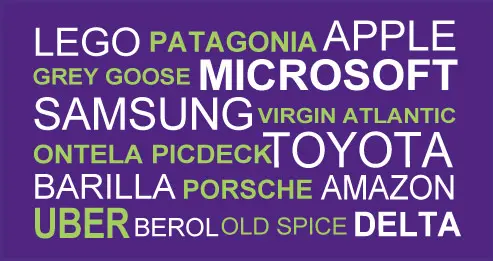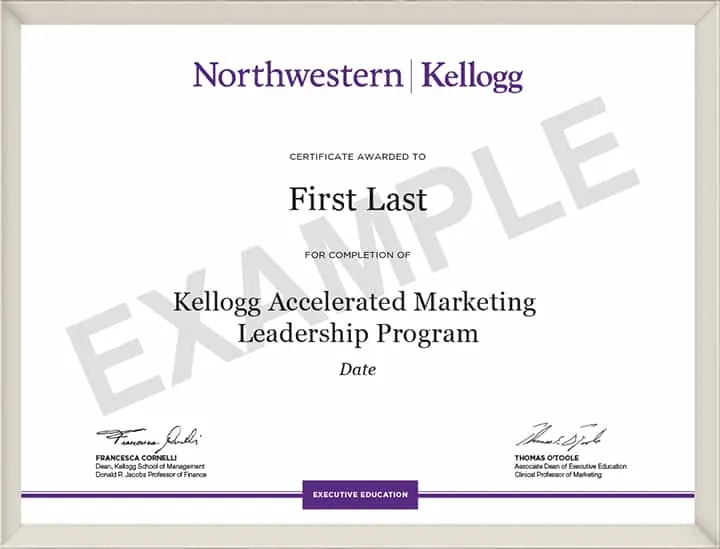Kellogg Accelerated Marketing Leadership Program
Accelerate Your Path to Marketing Leadership
To chart a successful career path in today’s market you must champion customers, master data, arbitrate brands, adopt innovation, communicate vision, and implement strategy.
38 percent of CMOs plan on using data to drive their marketing strategies and companies over the next two years. (Source: Forbes)
A majority of CMOs report that their teams do not have the expertise needed to execute their marketing strategy—a challenge they face during a significant upswing in demand for marketing talent. (Source: Gartner)
#1
Kellogg is ranked No. 1 among business schools for marketing education, according to the U.S. News & World Report, 2025.
Key Takeaways
In this program, you will gain an end-to-end perspective on the modern marketing operating model, from crafting strategic content to leveraging data analytics and connecting with customers. You will also master leadership skills to advance your career.
Explore critical leadership skills to more effectively develop your team, build your influence, and shape your career.
Harness the power of your brands to offer a distinct customer advantage.
Implement agile marketing process and tools for your organization.
Use tools of automation and AI to market more efficiently.
Establish product leadership in your market segment.
Improve your strategic decision-making and problem-solving skills.
Develop winning customer experiences across your product portfolio.
Identify and target the right customers and maximize value through differentiation.
Employ response-based segmentation and automated behavioral marketing to develop more data-driven targeting strategies.
Learning Journey
Based on three pillars of successful marketing, our curriculum coaches you in shifting your strategic approach as new competitors and platforms emerge. You will be primed to act decisively in a changing market as you draw insights from these building blocks of successful leadership.
Underpinning every topic in this program are the themes of Personal Leadership and Leading the Marketing Team, allowing you to view each of the marketing skills, strategies, and insights through the lens of leadership.

Program Modules
Pathway to Becoming an Executive Scholar
Participants who successfully complete the Kellogg Accelerated Marketing Leadership Program will accrue points towards becoming an esteemed Kellogg Executive Scholar; a unique credential that provides you the opportunity to customize your pathway to achieve your professional development goals.
Kellogg’s expansive program offerings allow you to build a variety of competencies that focus on practical application. More than about learning to lead, the path to becoming an Executive Scholar is about leading through learning.

Case Studies and Industry Examples
Case studies and real-world industry examples offer contextually rich scenarios that allow you to dive deeper into the complexities of modern marketing solutions. In this program, you will examine how leading companies across a range of industries are evaluating and deploying innovative marketing strategies.
Note: All product and company names are trademarks or registered trademarks of their respective holders. Use of these names does not imply any affiliation with or endorsement by their holders.
Program Experience

Self-Paced Video Lectures

Live Webinars With Faculty

Real-World Applications and Activities

Peer-to-Peer Learning

Case Studies

Office Hours with Program Leaders
Blockbuster Program Faculty

Senior Fellow and Adjunct Professor, Kellogg Markets and Customers Initiative
After a career at General Electric in multiple senior marketing leadership roles, including Chief Marketing Officer GE Healthcare Digital, Prof. Caffentzis is a Senior Fellow ...

Clinical Professor of Marketing and Associate Chair of Marketing Department
Author, speaker, and consultant, Prof. Calkins helps people and organizations build strong brands. He teaches courses that include Marketing Strategy and Biomedical Marketing....

Harold T. Martin Professor of Marketing, Director of the Center for Market Leadership and Faculty Director, Kellogg Markets and Customers Initiative
Prof. Carpenter is the author or co-editor of several books. His work often appears in leading academic journals and the popular press. He teaches Consumers, Culture & Leaders...

Michael S. and Mary Sue Shannon Clinical Endowed Professor of Entrepreneurship
After occupying marketing leadership roles with PepsiCo, Frito-Lay, Electronic Arts and Wal-Mart, Prof. Cast, now, is an award-winning author and venture partner for Pritzker ...

Lecturer of Marketing and Program Director, Business Marketing Strategy, Executive Education
A growth strategist with more than 40 years of experience working in leadership at companies like Deloitte, Prof. Copulsky is a brand and strategy expert. He teaches Advanced ...

Adjunct Lecturer of Marketing
A consumer anthropologist and principal of the Chicago marketing firm, Fong Insight, Prof. Fong helps clients channel consumer insights to delight their audience across the en...

Professor of Psychology, Weinberg College of Arts & Sciences, Professor of Design, McCormick School of Engineering (Courtesy), Director, Northwestern Cognitive Science Program and Professor of Leadership, Kellogg School of Management (Courtesy)
The director of the Visual Thinking Laboratory, Prof. Franconeri is a leading scientist, teacher, and speaker on visual thinking, visual communication, and the psychology of d...

Clinical Professor of Marketing and Associate Chair of the Marketing Department
Prof. Hennessy's MBA and Executive Education teaching focuses on marketing strategies for long-term competitive advantage and profitability. She works often with research and ...

Clinical Professor, Executive Education
Prof. Leininger is a Sr. Fellow and Adjunct Professor of Executive Education at Kellogg. He joined Kellogg as part-time faculty in 2008 and full-time in 2010 after serving as ...

Clinical Associate Professor of Marketing, Kellogg School of Management
Prof. McTigue teaches multiple classes for the MBA and Executive Education programs at Kellogg. He is an expert in consulting, brand management, and advertising. He was involv...

Associate Dean, Executive Education, and Clinical Professor of Marketing
Prof. O’Toole’s work at Kellogg focuses on connecting data science to business value creation, data-driven marketing, customer strategy, customer value management, and loyalty...

Clinical Professor of Management & Organizations
Scholar, speaker, activist, author, entrepreneur, and pastor, Prof. Pearce teaches several Executive Education courses on marketing, leadership and organizational change, as w...

Sandy & Morton Goldman Professor of Entrepreneurial Studies in Marketing, Professor of Marketing, and Co-chair of Faculty Research
Prof. Rucker’s research focuses on social hierarchy, compensatory consumption, persuasion, and consumer behavior, drawing on his training in social psychology. His work has ap...

Associate Dean for Digital Innovation, McCormick Foundation Chair of Technology, Clinical Professor of Marketing, and Director of the Center for Research in Technology and Innovation
Prof. Sawhney is a globally recognized scholar, teacher, consultant, and speaker on business innovation, modern marketing, and enterprise analytics. He has written seven manag...

Clinical Professor of Leadership, Academic Director, Leading the Family Enterprise, and Faculty Director of Coaching, Zell Fellows
Prof. Vuckovic teaches on a variety of leadership topics, including Moral Complexity in Leadership. She takes a deep interest in multigenerational family enterprises and found...
Testimonials
Tuition and Payment Options
We offer several options to help you afford tuition for the Kellogg Accelerated Marketing Leadership Program. Available opportunities to lower tuition fees include:
Referrals – You and a colleague can each receive $500 off your tuition when you enroll together. Refer now
Group enrollments – A discount of up to 20% is available for group enrollments. For more information, email group-enrollments@emeritus.org
We also offer a variety of payment options:
Installments – Pay in installments of 1, 2, 3, or 6 payments Learn more
US Residents (Deferred payment option available)
Pay nothing while you learn – Starting at $25 per month, flexible and transparent financing options are available through our partners and Sallie Mae.
Sallie Mae – Monthly payments starting at US$25.
*At the time of loan application, please select ‘Undergraduate students’ when prompted.

Certificate
Upon successful completion of the program, Kellogg Executive Education grants a verified digital certificate of completion to participants. This program is graded as pass or fail. Participants must complete 80% of the program to earn the certificate of completion.
Designed as a highly interactive learning experience, there are pre-determined group-based activities planned for most weeks. As such, we expect participants will commit to being present through the entire duration of the session as everyone’s learning experience is affected by each member’s attendance.
Note: After successful completion of the online program, your verified digital certificate will be emailed to you in the name you used when registering for the program. All certificate images are for illustrative purposes only and may be subject to change at the discretion of Kellogg Executive Education. This online certificate of completion does not grant academic credit or a degree from Kellogg School of Management.
FAQs
Didn't find what you were looking for? Write to us at learner.success@emeritus.org or Schedule a call with one of our Program Advisors or call us at +1 315 502 3308 (US) / +44 128 291 1923 (UK) / +65 3129 4131 (SG)
Early registrations are encouraged. Seats fill up quickly!
Flexible payment options available.
Starts On



